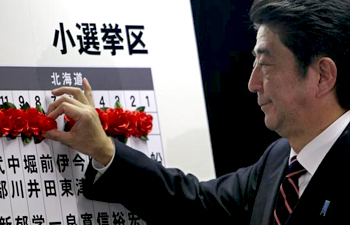
New Delhi, December 18: More than incoming Japanese Prime Minister Shinzo Abe's professed proclivity towards India, New Delhi is hoping that the next Government in Tokyo will be more decisive on strategic issues.
The trend of India-Japan relations under three Prime Ministers of the previous Democratic Party of Japan (DPJ) remained positive but India's responses had to be re-calibrated because each Premier had a different take on the geo-political situation and trends, said Government sources.
Officials concede that Mr. Abe had set India-Japan ties on the high road when he was Prime Minister five years back. They also concur with the assessment by strategic experts that he retained his assessment of India as a key spoke in Japan's scheme of things even after demitting office. But they feel it would be wrong to talk about one entity. “The Government is not supporting one person or the other. It is wrong to crow about the importance of one entity. It is not as if he is special and others are not,” said the sources.
“The only thing we wish is that the new Government will be more decisive. The trend with the DPJ Government continued in the same positive vein as with Liberative Democratic Party (LDP) Governments. But certain decisions took time and the DPJ Government spoke in different voices at the same time,” they added.
The strategic orientation of each DPJ Prime Minister was different. When Yukio Hatoyama became Prime Minister, he tried to draw a line on U.S.-Japan-China relations. His successor Naoto Kan tried to but couldn't turn around this approach. And Yoshihiko Noda, who followed as Prime Minister, put up the U.S.-Japan alliance as the basis of Tokyo's foreign policy and international strategy.
The accent on different strategic line ups by successive Prime Ministers of the same party, feel the sources, is now in the past and India-Japan ties would further enhance and expand due to Mr. Abe's ideological orientation — he wants to revise Japan's Constitution by designating the defence forces as military and enhanced defence ties with nations (that includes India in the first tier) that do not harbour ill will against Japan.
This means that India's defence and strategic ties with Japan could become stronger. Even if the civil nuclear agreement could take some time, India could look forward to the removal of some of its companies from the list that restricts their interaction with Japanese companies.
The last such revision took place two years back, around the time India agreed to hold a 2 + 2 dialogue involving Defence and Foreign Secretaries from both countries. Ironically, the removal of some Indian companies from the Japanese export control list benefited Tokyo more during its time of need.
Indian Rare Earths Limited, which was on Japan's export control list but was removed in 2010, has come to the rescue of Japan's automobile industry by promising to supply the mineral. China had refused to supply rare earth materials.






Comments
Add new comment